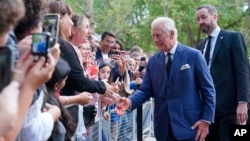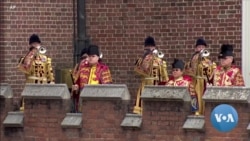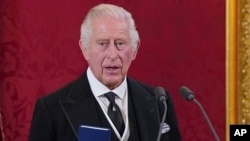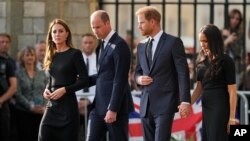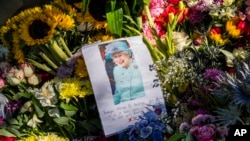King Charles III was formally proclaimed as Britain’s monarch and head of the Commonwealth Saturday, in a ceremony that traces its history back several hundred years.
Charles became king upon the death of his mother, Queen Elizabeth II, on Thursday. She had been on the throne for 70 years. The royal family announced that her funeral would be September 19 at Westminster Abbey in London.
Pomp and ceremony
Elizabeth’s first son, Charles, was proclaimed king in a ceremony at St James’s Palace in London, which was broadcast on television for the first time. Senior politicians, judges and officials — including all six of Britain’s living former prime ministers — gathered for the “Accession Council” to formally recognize the new monarch.
Using language that drew on centuries of tradition, the clerk of the Privy Council Richard Tilbrook made the historic proclamation.
“We … do now hereby, with one voice and consent of tongue and heart, publish and proclaim that the Prince Charles Philip Arthur George, is now, by the death of our late sovereign of happy memory, become our only lawful and rightful liege Lord Charles III.”
“By the grace of God, of the United Kingdom of Great Britain and Northern Ireland, and of his other realms and territories, king, head of the Commonwealth, defender of the faith, to whom we do acknowledge all faith and obedience with humble affection, beseeching God by whom kings and queens do reign to bless His Majesty with long and happy years to reign over us. God save the King,” Tilbrook said.
Tribute
King Charles III then addressed the council and paid tribute to his late mother, Queen Elizabeth II.
“To all of us as a family, as to this kingdom and the wider family of nations of which it is a part, my mother gave an example of lifelong love and of selfless service. My mother's reign was unequalled in its duration, its dedication, and its devotion. Even as we grieve, we give thanks for this most faithful life,” Charles said.
The proclamation was then repeated from the balcony of St James’s Palace and in the City of London, the ancient heart of the British capital. Gun salutes rang out to welcome the new king.
In Parliament, senior lawmakers, including the new Prime Minister Liz Truss pledged allegiance to the new king.
Buckingham Palace
King Charles and his wife, Queen Consort Camilla, then traveled to their new home at Buckingham Palace. Thousands of onlookers cheered their new king.
“It just felt like a really special moment in history. And it was lovely actually seeing him, I didn't think I would feel as emotional as I did. Just really special,” said Beverley Nash, who traveled to London from her home in Kent, southeast England to witness the event.
They are complex emotions for a country undergoing profound historical change: welcoming a new king, while mourning the death of deeply loved queen.
In Windsor, west of London, royal family feuds were put aside. William and Catherine — the newly appointed Prince and Princess of Wales — and the Duke and Duchess of Sussex, Harry and Meghan, emerged from the royal residence together to greet well-wishers and inspect floral tributes to the late queen outside Windsor Castle.
Funeral
In the coming days Elizabeth II’s body will be taken to Edinburgh and then to London, where she will lie in state in Westminster Hall for several days. The royal family announced that her funeral is to take place September 19 at Westminster Abbey.
Dozens of world leaders, including U.S. President Joe Biden, are expected to attend.




